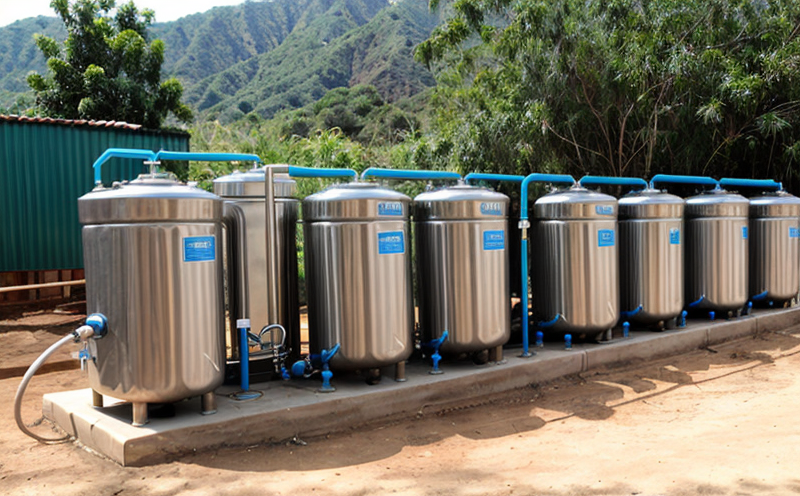ASTM D6975 Biofilm Formation Potential Test in Wastewater
The ASTM D6975 test method is a critical tool for wastewater treatment facilities and environmental scientists to evaluate the biofilm formation potential of water systems. Biofilms are colonies of microorganisms that can attach to surfaces, leading to fouling, corrosion, and reduced efficiency in water treatment processes. Understanding these biofilm formations is essential for maintaining optimal performance in drinking water systems.
The ASTM D6975 test assesses the ability of microorganisms present in wastewater to form biofilms under specific conditions. This method provides a standardized approach for measuring the potential for biofilm growth, which can help facilities predict and mitigate issues related to biofouling. The test involves exposing samples to controlled conditions that simulate real-world scenarios, allowing for accurate quantification of biofilm formation.
The process begins with the collection of wastewater samples from various points in the treatment system. These samples are then inoculated with a standardized culture medium and incubated under controlled environmental conditions. Over time, the microorganisms within the sample will either form biofilms or not; this is determined by observing changes in turbidity, biomass accumulation, and other measurable parameters.
The ASTM D6975 test provides valuable insights into the microbial community present in wastewater systems, helping operators identify potential problem areas early on. By understanding which organisms are most likely to contribute to biofilm formation, treatment plant managers can implement targeted strategies to prevent or manage these issues effectively.
One of the key benefits of this test is its ability to predict long-term performance by simulating real-world conditions in a laboratory setting. This allows for more informed decision-making regarding operational adjustments and maintenance schedules. Additionally, ASTM D6975 testing helps ensure compliance with environmental regulations related to water quality standards.
In summary, the ASTM D6975 biofilm formation potential test is an essential tool for anyone involved in managing wastewater systems. It provides a reliable means of evaluating microbial activity within these environments and offers actionable data that supports effective management practices aimed at improving overall system performance while minimizing operational costs associated with biofouling issues.
Why Choose This Test
Selecting the appropriate test method for evaluating biofilm formation in wastewater systems is crucial for ensuring accurate results and informed decision-making. The ASTM D6975 Biofilm Formation Potential Test offers several advantages over other available methods:
- Standardized Protocol: By following a universally accepted standard, laboratories can ensure consistent results across different facilities.
- Realistic Simulations: The test mimics actual environmental conditions found in wastewater systems, providing more accurate predictions about future biofilm growth patterns.
- Comprehensive Data: ASTM D6975 provides detailed information on various aspects of microbial behavior, including attachment rates and biomass accumulation.
- Regulatory Compliance: Many regulatory bodies recommend or require compliance with ASTM standards for assessing water quality issues. Using this test ensures that your facility meets all necessary requirements.
These factors make the ASTM D6975 Biofilm Formation Potential Test a preferred choice among professionals responsible for maintaining high-quality drinking water systems. It not only enhances operational efficiency but also contributes significantly to environmental sustainability efforts by minimizing unnecessary chemical treatments and reducing energy consumption associated with biofouling mitigation.
Quality and Reliability Assurance
The ASTM D6975 Biofilm Formation Potential Test is designed to provide consistent, reliable results that can be trusted by all stakeholders involved in wastewater management. To achieve this level of accuracy and dependability, several quality control measures are implemented throughout the testing process:
- Standard Operating Procedures (SOPs): Each laboratory adheres strictly to predefined protocols when conducting ASTM D6975 tests. These SOPs ensure that every step from sample collection to final analysis is performed uniformly.
- Calibration of Equipment: All instruments used in the testing process are regularly calibrated against known reference standards to guarantee precise measurements.
- Training and Certification: Personnel responsible for performing ASTM D6975 tests undergo comprehensive training programs and maintain certification from recognized bodies. This ensures they possess the necessary skills and knowledge required to execute the test correctly.
- Quality Control Samples: Duplicate samples are analyzed alongside primary test samples as part of ongoing quality assurance checks. Any discrepancies between these duplicates help identify potential errors early in the process.
The commitment to maintaining strict adherence to ASTM D6975 guidelines, combined with advanced laboratory infrastructure and experienced personnel, guarantees that clients receive trustworthy results they can rely upon when making important decisions related to their wastewater systems.
Use Cases and Application Examples
| Application | Description |
|---|---|
| Treatment Plant Monitoring | Detect early signs of biofilm formation to optimize operational parameters. |
| New System Design Evaluation | Evaluate the effectiveness of design changes in preventing biofouling. |
| Chemical Treatment Optimization | Identify suitable biocides and other chemicals for effective control. |
| Risk Assessment | Predict potential risks associated with biofilm growth on critical infrastructure components. |
| Application | Description |
|---|---|
| Maintenance Scheduling | Determine optimal intervals for cleaning and disinfection based on biofilm formation trends. |
| Pollution Control Strategies | Evaluate the impact of different pollution control measures on biofilm development. |
| Research and Development | Study novel approaches to enhance water quality through advanced treatment techniques. |
| Regulatory Compliance Audits | Ensure adherence to government regulations regarding biofouling prevention in wastewater systems. |
The ASTM D6975 Biofilm Formation Potential Test finds extensive application across various sectors within the environmental testing industry. From municipal water treatment plants to industrial facilities, this test plays a vital role in ensuring optimal performance and compliance with regulatory requirements. By providing actionable insights into biofilm formation potential, it enables stakeholders to take proactive steps towards maintaining healthy aquatic ecosystems while minimizing operational disruptions.





